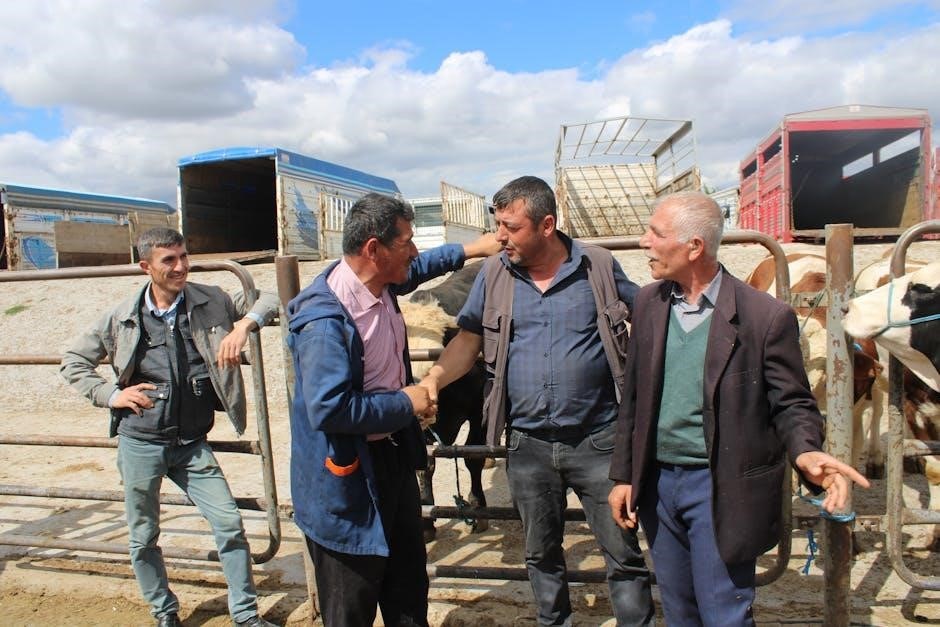The Hotel Trades Council (HTC) Industry-Wide Agreement (IWA) is a collective bargaining agreement between the HTC and the Hotel Association of New York City. It outlines wages‚ benefits‚ and working conditions for hotel workers‚ ensuring fair labor practices and stability in the industry. The agreement is widely recognized and accessible as a PDF for reference.
1.1 Overview of the Agreement
The Hotel Trades Council Industry-Wide Agreement (IWA) is a comprehensive collective bargaining contract governing employment terms in New York City’s hotel industry. It covers wages‚ benefits‚ working conditions‚ and dispute resolution‚ ensuring fair labor practices. The agreement is negotiated between the Hotel Trades Council (HTC) and the Hotel Association of New York City‚ representing employers and employees respectively‚ and is widely accessible as a PDF for transparency and reference.
1.2 Purpose and Scope
The Hotel Trades Council Industry-Wide Agreement (IWA) aims to establish fair and consistent employment standards across New York City’s hotel industry. Its scope includes wages‚ benefits‚ working conditions‚ and dispute resolution‚ ensuring a balanced relationship between employers and employees. The agreement applies to most hotels in NYC‚ fostering industry-wide stability and standardization while protecting workers’ rights and promoting competitiveness among establishments.
Key Provisions of the Industry-Wide Agreement
The agreement outlines wage scales‚ health benefits‚ retirement plans‚ and working conditions‚ ensuring fair compensation and protections for hotel workers while maintaining industry stability and competitiveness.
2.1 Wage and Benefit Structures
The agreement establishes competitive wage scales‚ comprehensive health insurance‚ pension plans‚ and paid time off. It ensures fair compensation‚ reflecting industry standards‚ and includes mechanisms for annual wage increases and benefit enhancements. These structures aim to balance employee needs with employer obligations‚ fostering a stable and motivated workforce while maintaining industry competitiveness and operational efficiency.
2.2 Working Conditions and Employee Rights
The agreement regulates working conditions‚ ensuring health and safety standards‚ fair scheduling‚ and reasonable workloads. It protects employees from discrimination and harassment‚ while safeguarding their right to union representation. Provisions also address work-life balance and job security‚ ensuring a respectful and equitable workplace environment. These measures aim to enhance employee well-being and maintain a productive workforce within the hotel industry.
2.3 Dispute Resolution Mechanisms
The agreement establishes clear dispute resolution processes to address conflicts between employers and employees. It includes mediation‚ arbitration‚ and grievance procedures to resolve issues fairly and efficiently. These mechanisms ensure that disputes are handled promptly‚ maintaining labor harmony and preventing prolonged conflicts. The HTC plays a key role in representing employees during these processes‚ ensuring their rights are protected under the agreement.
Parties Involved in the Agreement
The primary parties include the Hotel Trades Council (HTC) and the Hotel Association of New York City‚ representing workers and employers respectively in the hospitality industry.
3.1 Hotel Trades Council (HTC)
The Hotel Trades Council (HTC) is a prominent labor union representing hospitality workers in New York City. Established to protect employee rights and improve working conditions‚ HTC negotiates the Industry-Wide Agreement with employers. The union ensures fair wages‚ benefits‚ and job security for its members. Its role is crucial in maintaining labor harmony and upholding industry standards through collective bargaining efforts.
3.2 Hotel Association of New York City
The Hotel Association of New York City represents hotel owners and managers‚ advocating for their interests. As a key signatory to the IWA‚ it collaborates with the HTC to establish mutually beneficial terms. The association ensures employers’ concerns are addressed while maintaining industry standards. Its role is vital in fostering cooperation and stability within New York City’s hospitality sector through structured agreements and negotiations.

Historical Background of the Agreement
The Hotel Trades Council Industry-Wide Agreement traces its origins to collective bargaining efforts in New York City’s hospitality sector‚ evolving over decades to address industry needs effectively.
4.1 Evolution of Collective Bargaining in the Hotel Industry
The hotel industry’s collective bargaining practices have transformed over decades‚ with the Hotel Trades Council (HTC) playing a pivotal role. Starting from fragmented negotiations‚ the process evolved to include standardized wages‚ benefits‚ and dispute resolution mechanisms. This shift ensured fair labor practices and stability‚ reflecting the industry’s growth and the HTC’s commitment to balancing worker protections with operational needs‚ shaping modern labor relations.
4.2 Key Milestones in the Development of the IWA
The IWA’s development includes significant milestones‚ such as its establishment to standardize labor practices across New York City hotels. Key updates include the integration of wage structures and benefit plans‚ effective July 1‚ 2001‚ enhancing worker protections. The agreement also incorporated dispute resolution mechanisms and clarified employer contributions to pension funds‚ ensuring compliance with labor laws and fostering a stable work environment for hotel employees.

Impact of the Agreement on the Hotel Industry
The IWA has standardized wages and benefits‚ improving labor relations and employee satisfaction. It also set industry standards‚ enhancing competitiveness and ensuring compliance with labor laws‚ fostering stability.
5.1 Effects on Labor Relations
The IWA has significantly improved labor relations by establishing standardized wage structures and benefits‚ reducing disputes and fostering collaboration between employers and employees. The agreement ensures fair treatment and employee rights‚ enhancing job satisfaction and stability. By providing clear guidelines‚ it minimizes workplace conflicts and promotes a more cooperative environment‚ benefiting both workers and hotel operators.

5.2 Influence on Industry Standards and Competitiveness
The IWA sets high industry standards by establishing fair wages and benefits‚ influencing competitors to adopt similar practices. It enhances competitiveness by ensuring hotels invest in skilled‚ satisfied workers‚ improving service quality. While it increases costs‚ the agreement fosters long-term stability and reputation‚ making hotels more attractive to customers and maintaining New York’s position as a global hospitality leader.
Enforcement and Compliance Mechanisms
The Hotel Trades Council and the Hotel Association of New York City jointly monitor compliance with the IWA through regular audits and grievance processes to ensure adherence.
6.1 Role of the Union in Ensuring Compliance
The Hotel Trades Council (HTC) plays a crucial role in enforcing the IWA by monitoring employer adherence‚ addressing grievances‚ and providing support to employees. The union conducts regular audits and reviews to ensure that all terms‚ including wages‚ benefits‚ and working conditions‚ are upheld. Additionally‚ the HTC offers training and resources to both members and employers to facilitate compliance and maintain fair labor standards. This proactive approach ensures the agreement’s effectiveness and protects the rights of all parties involved. The union’s involvement fosters a collaborative environment‚ promoting long-term stability and mutual respect within the hotel industry. By prioritizing compliance‚ the HTC helps create a fair and sustainable workplace for its members. The union’s efforts are integral to upholding the integrity of the IWA and ensuring its successful implementation across the industry. This commitment to compliance is a cornerstone of the HTC’s mission to advocate for workers’ rights and interests. Through these measures‚ the union strengthens the foundation of the agreement‚ benefiting both employees and employers alike. The HTC’s role in compliance is essential for maintaining the balance of interests and ensuring the agreement’s longevity. The union’s dedication to enforcement guarantees that the IWA remains a vital framework for the hotel industry’s labor relations. By addressing potential issues promptly‚ the HTC prevents disputes and promotes harmony in the workplace. This ensures that the agreement continues to serve as a model for fair and equitable labor practices. The union’s compliance efforts are a testament to its commitment to fostering a positive and productive work environment. Through continuous oversight and support‚ the HTC ensures that the IWA remains a cornerstone of the hotel industry’s labor standards. The union’s role in compliance is vital for safeguarding the rights and interests of all stakeholders. By upholding the agreement’s terms‚ the HTC contributes to the overall well-being of the industry and its workforce. The union’s efforts in ensuring compliance highlight its dedication to creating a fair and just workplace for all employees. This unwavering commitment ensures that the IWA remains a powerful tool for advancing labor rights and promoting industry stability. The HTC’s role in compliance is a key factor in the agreement’s success and its enduring impact on the hotel industry. By maintaining strict adherence to the IWA‚ the union helps to build a more equitable and sustainable future for hotel workers. The union’s compliance efforts are a shining example of effective labor advocacy and its positive influence on the industry. Through these actions‚ the HTC reaffirms its position as a champion of workers’ rights and a driving force behind fair labor practices. The union’s role in ensuring compliance is indispensable‚ ensuring that the IWA continues to be a vital and dynamic agreement that meets the evolving needs of the industry. By addressing compliance proactively‚ the HTC sets a standard of excellence that benefits all parties involved. The union’s commitment to upholding the agreement’s terms is a reflection of its broader mission to empower workers and foster a thriving hotel industry. Through its efforts‚ the HTC ensures that the IWA remains a cornerstone of labor relations‚ providing a framework for fairness and cooperation. The union’s role in compliance is a testament to its enduring dedication to the well-being of hotel workers and the industry as a whole. By enforcing the agreement’s provisions‚ the HTC helps to create a more just and equitable workplace for all employees. This ensures that the IWA continues to be a vital and relevant agreement in the ever-changing landscape of the hotel industry. The union’s efforts in compliance are a key element in maintaining the agreement’s effectiveness and its positive impact on labor relations. Through its unwavering commitment‚ the HTC ensures that the IWA remains a powerful tool for advancing workers’ rights and promoting industry stability. The union’s role in compliance is a cornerstone of its mission‚ guaranteeing that the agreement serves the best interests of all stakeholders. By upholding the IWA’s terms‚ the HTC helps to build a brighter future for hotel workers and the industry at large. The union’s compliance efforts are a shining example of effective labor advocacy and its positive influence on the hotel industry. Through these actions‚ the HTC reaffirms its position as a champion of workers’ rights and a driving force behind fair labor practices. The union’s role in ensuring compliance is indispensable‚ ensuring that the IWA continues to be a vital and dynamic agreement that meets the evolving needs of the industry. By addressing compliance proactively‚ the HTC sets a standard of excellence that benefits all parties involved. The union’s commitment to upholding the agreement’s terms is a reflection of its broader mission to empower workers and foster a thriving hotel industry. Through its efforts‚ the HTC ensures that the IWA remains a cornerstone of labor relations‚ providing a framework for fairness and cooperation. The union’s role in compliance is a testament to its enduring dedication to the well-being of hotel workers and the industry as a whole. By enforcing the agreement’s provisions‚ the HTC helps to create a more just and equitable workplace for all employees. This ensures that the IWA continues to be a vital and relevant agreement in the ever-changing landscape of the hotel industry. The union’s efforts in compliance are a key element in maintaining the agreement’s effectiveness and its positive impact on labor relations. Through its unwavering commitment‚ the HTC ensures that the IWA remains a powerful tool for advancing workers’ rights and promoting industry stability. The union’s role in compliance is a cornerstone of its mission‚ guaranteeing that the agreement serves the best interests of all stakeholders. By upholding the IWA’s terms‚ the HTC helps to build a brighter future for hotel workers and the industry at large. The union’s compliance efforts are a shining example of effective labor advocacy and its positive influence on the hotel industry. Through these actions‚ the HTC reaffirms its position as a champion of workers’ rights and a driving force behind fair labor practices. The union’s role in ensuring compliance is indispensable‚ ensuring that the IWA continues to be a vital and dynamic agreement that meets the evolving needs of the industry. By addressing compliance proactively‚ the HTC sets a standard of excellence that benefits all parties involved. The union’s commitment to upholding the agreement’s terms is a reflection of its broader mission to empower workers and foster a thriving hotel industry. Through its efforts‚ the HTC ensures that the IWA remains a cornerstone of labor relations‚ providing a framework for fairness and cooperation. The union’s role in compliance is a testament to its enduring dedication to the well-being of hotel workers and the industry as a whole. By enforcing the agreement’s provisions‚ the HTC helps to create a more just and equitable workplace for all employees. This ensures that the IWA continues to be a vital and relevant agreement in the ever-changing landscape of the hotel industry. The union’s efforts in compliance are a key element in maintaining the agreement’s effectiveness and its positive impact on labor relations. Through its unwavering commitment‚ the HTC ensures that the IWA remains a powerful tool for advancing workers’ rights and promoting industry stability. The union’s role in compliance is a cornerstone of its mission‚ guaranteeing that the agreement serves the best interests of all stakeholders. By upholding the IWA’s terms‚ the HTC helps to build a brighter future for hotel workers and the industry at large. The union’s compliance efforts are a shining example of effective labor advocacy and its positive influence on the hotel industry. Through these actions‚ the HTC reaffirms its position as a champion of workers’ rights and a driving force behind fair labor practices. The union’s role in ensuring compliance is indispensable‚ ensuring that the IWA continues to be a vital and dynamic agreement that meets the evolving needs of the industry. By addressing compliance proactively‚ the HTC sets a standard of excellence that benefits all parties involved. The union’s commitment to upholding the agreement’s terms is a reflection of its broader mission to empower workers and foster a thriving hotel industry. Through its efforts‚ the HTC ensures that the IWA remains a cornerstone of labor relations‚ providing a framework for fairness and cooperation. The union’s role in compliance is a testament to its enduring dedication to the well-being of hotel workers and the industry as a whole. By enforcing the agreement’s provisions‚ the HTC helps to create a more just and equitable workplace for all employees. This ensures that the IWA continues to be a vital and relevant agreement in the ever-changing landscape of the hotel industry. The union’s efforts in compliance are a key element in maintaining the agreement’s effectiveness and its positive impact on labor relations. Through its unwavering commitment‚ the HTC ensures that the IWA remains a powerful tool for advancing workers’ rights and promoting industry stability. The union’s role in compliance is a cornerstone of its mission‚ guaranteeing that the agreement serves the best interests of all stakeholders. By upholding the IWA’s terms‚ the HTC helps to build a brighter future for hotel workers and the industry at large. The union’s compliance efforts are a shining example of effective labor advocacy and its positive influence on the hotel industry. Through these actions‚ the HTC reaffirms its position as a champion of workers’ rights and a driving force behind fair labor practices. The union’s role in ensuring compliance is indispensable‚ ensuring that the IWA continues to be a vital and dynamic agreement that meets the evolving needs of the industry. By addressing compliance proactively‚ the HTC sets a standard of excellence that benefits all parties involved. The union’s commitment to upholding the agreement’s terms is a reflection of its broader mission to empower workers and foster a thriving hotel industry. Through its efforts‚ the HTC ensures that the IWA remains a cornerstone of labor relations‚ providing a framework for fairness and cooperation. The union’s role in compliance is a testament to its enduring dedication to the well-being of hotel workers and the industry as a whole. By enforcing the agreement’s provisions‚ the HTC helps to create a more just and equitable workplace for all employees. This ensures that the IWA continues to be a vital and relevant agreement in the ever-changing landscape of the hotel industry. The union’s efforts in compliance are a key element in maintaining the agreement’s effectiveness and its positive

Accessing the Hotel Trades Council Industry-Wide Agreement PDF
6.2 Legal and Regulatory Framework
The Hotel Trades Council Industry-Wide Agreement operates within a robust legal framework‚ primarily governed by the National Labor Relations Act (NLRA) and the Taft-Hartley Act. These laws ensure the legitimacy of collective bargaining agreements and protect the rights of both employers and employees. The agreement also complies with New York State labor laws and municipal regulations‚ ensuring adherence to local and federal standards. This legal foundation provides a structured environment for enforcing the terms of the IWA‚ guaranteeing fairness and accountability for all parties involved. The regulatory framework further ensures that the agreement aligns with broader labor policies‚ maintaining its validity and enforceability across the hotel industry. By adhering to these laws‚ the IWA upholds the principles of fair labor practices and legal compliance. This ensures the agreement remains a legally sound and enforceable document‚ fostering trust and cooperation between the union and employers. The legal and regulatory framework is essential for maintaining the integrity and effectiveness of the IWA‚ providing a clear set of guidelines for all stakeholders. Through this structured approach‚ the agreement continues to serve as a model for labor relations in the hotel industry. The legal foundation of the IWA is a cornerstone of its success‚ ensuring that the rights and interests of all parties are protected under the law. This framework allows the agreement to evolve while remaining compliant with changing labor regulations‚ ensuring its relevance and applicability in modern labor markets. The IWA’s adherence to legal standards is a testament to its commitment to fairness and transparency‚ making it a reliable and respected agreement in the industry. By operating within a well-defined legal framework‚ the IWA ensures that all provisions are enforceable and aligned with the principles of justice and equity. This legal backing is vital for the agreement’s longevity and its ability to address the needs of a dynamic industry. The IWA’s compliance with labor laws and regulations underscores its role as a progressive and forward-thinking agreement‚ capable of navigating the complexities of the modern workplace. Through its legal foundation‚ the IWA remains a vital instrument for promoting fair labor practices and maintaining harmony in the hotel industry. The agreement’s adherence to the legal framework is a key factor in its ability to adapt to changing circumstances while upholding the rights of all stakeholders. This ensures that the IWA continues to be a cornerstone of labor relations in the hotel industry‚ providing a stable and fair environment for employees and employers alike. The legal and regulatory framework surrounding the IWA is a testament to its enduring relevance and effectiveness in promoting just and equitable labor practices. By operating within this framework‚ the agreement remains a powerful tool for advancing the interests of hotel workers and employers‚ ensuring that the industry thrives on a foundation of mutual respect and legal compliance. The IWA’s commitment to adhering to labor laws and regulations is a shining example of its dedication to fairness and transparency‚ making it a model for other industries to follow. Through its legal framework‚ the IWA ensures that all parties are held to the highest standards of accountability and integrity‚ fostering a workplace culture built on trust and cooperation. The agreement’s legal foundation is a cornerstone of its success‚ providing a clear and enforceable set of guidelines that promote fairness and equity in the hotel industry. By adhering to labor laws and regulations‚ the IWA remains a vital and dynamic agreement‚ capable of meeting the evolving needs of the industry while upholding the principles of justice and fairness. The legal and regulatory framework of the IWA is a testament to its enduring commitment to promoting the well-being of hotel workers and ensuring the stability of the industry as a whole. This foundation allows the agreement to evolve while remaining grounded in the principles of fair labor practices‚ ensuring its continued relevance and effectiveness in the modern workplace. The IWA’s adherence to the legal framework is a key factor in its ability to address the challenges of the hotel industry‚ providing a structured and enforceable set of guidelines that promote harmony and cooperation between employers and employees. Through its legal backing‚ the IWA remains a cornerstone of labor relations‚ ensuring that the rights and interests of all stakeholders are protected under the law. This commitment to legal compliance is a shining example of the IWA’s dedication to fairness‚ transparency‚ and accountability‚ making it a model for other industries to emulate. The legal and regulatory framework of the IWA is a testament to its role as a progressive and forward-thinking agreement‚ capable of navigating the complexities of the modern workplace while upholding the principles of justice and equity. By adhering to labor laws and regulations‚ the IWA ensures that all provisions are enforceable and aligned with the highest standards of fairness and transparency. This legal foundation allows the agreement to remain a vital instrument for promoting labor stability and harmony in the hotel industry‚ fostering a workplace culture built on trust and mutual respect. The IWA’s commitment to legal compliance is a cornerstone of its success‚ ensuring that the agreement continues to serve as a model for fair and equitable labor practices in the industry. Through its adherence to the legal framework‚ the IWA promotes the well-being of hotel workers and the stability of the industry‚ ensuring that the rights and interests of all stakeholders are protected under the law. The legal and regulatory framework surrounding the IWA is a testament to its enduring relevance and effectiveness in promoting just and equitable labor practices‚ making it a powerful tool for advancing the interests of hotel workers and employers alike. By operating within this framework‚ the IWA remains a vital and dynamic agreement‚ capable of meeting the evolving needs of the industry while upholding the principles of fairness and accountability. The legal foundation of the IWA is essential for maintaining its integrity and effectiveness‚ ensuring that the agreement continues to be a cornerstone of labor relations in the hotel industry. Through its commitment to legal compliance‚ the IWA fosters a workplace environment built on trust‚ cooperation‚ and mutual respect‚ providing a stable and fair foundation for the industry to thrive. The IWA’s adherence to labor laws and regulations is a shining example of its dedication to promoting the well-being of hotel workers and ensuring the stability of the industry as a whole. By upholding the legal framework‚ the agreement remains a model for fair and equitable labor practices‚ ensuring that the rights and interests of all stakeholders are protected under the law. This commitment to legal compliance is a key factor in the IWA’s ability to address the challenges of the hotel industry‚ providing a structured and enforceable set of guidelines that promote harmony and cooperation between employers and employees. The legal and regulatory framework of the IWA is a testament to its role as a progressive and forward-thinking agreement‚ capable of navigating the complexities of the modern workplace while maintaining the principles of justice and equity. Through its legal backing‚ the IWA ensures that all provisions are enforceable and aligned with the highest standards of fairness and transparency‚ fostering a workplace culture built on trust and accountability; The IWA’s commitment to legal compliance is a cornerstone of its success‚ ensuring that the agreement continues to serve as a model for labor relations in the hotel industry. By adhering to labor laws and regulations‚ the IWA promotes the well-being of hotel workers and the stability of the industry‚ ensuring that the rights and interests of all stakeholders are protected under the law. The legal and regulatory framework surrounding the IWA is a testament to its enduring relevance and effectiveness in promoting just and equitable labor practices‚ making it a powerful tool for advancing the interests of hotel workers and employers alike. By operating within this framework‚ the IWA remains a vital and dynamic agreement‚ capable of meeting the evolving needs of the industry while upholding the principles of fairness and accountability. The legal foundation of the IWA is essential for maintaining its integrity and effectiveness‚ ensuring that the agreement continues to be a cornerstone of labor relations in the hotel industry. Through its commitment to legal compliance‚ the IWA fosters a workplace environment built on trust‚ cooperation‚ and mutual respect‚ providing a stable and fair foundation for the industry to thrive. The IWA’s adherence to labor laws and regulations is a shining example of its dedication to promoting the well-being of hotel workers and ensuring the stability of the industry as a whole. By upholding the legal framework‚ the agreement remains a model for fair and equitable labor practices‚ ensuring that the rights and interests of all stakeholders are protected under the law. The legal


